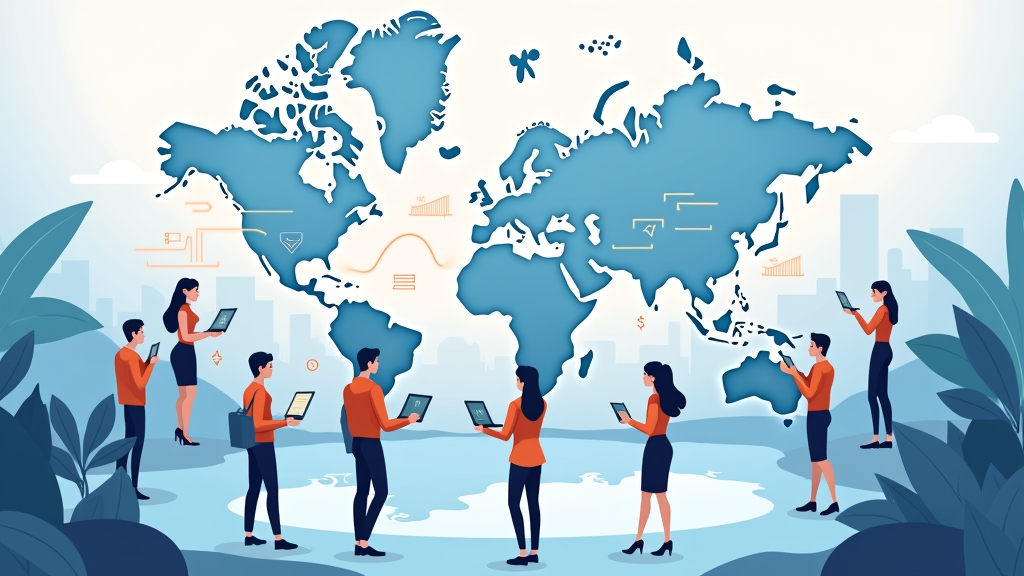The Phenomenon of "Geographic Resilience Jobs": A New Labor Paradigm
Imagine being able to work from anywhere in the world, adapting to political and economic crises or even climate change without losing your professional stability. Sound like a distant dream? This reality is already shaping careers in the 21st century. "Geographic resilience jobs" represent a radical transformation in the way we look at employment, prioritizing flexibility and adaptation over fixed location.
Professionals are discovering that, in a volatile world, the ability to migrate between countries, cultures and economies can be just as valuable as an elite degree. But how does this work in practice? What skills are needed? And most importantly: are you ready for this revolution?
The Rise of Labor Mobility as a Response to Global Uncertainty
The COVID-19 pandemic was a watershed. Suddenly, millions discovered they could work remotely - and many never went back to the office. But that's just the tip of the iceberg. Economic crises, wars, trade sanctions and even natural disasters are forcing professionals to rethink their relationship with the workplace.
An emblematic example are the Ukrainian software developers who, even during the Russian invasion in 2022, continued to deliver projects for global clients, often relocated or in extreme conditions. Their digital skills gave them a geographical resilience that other professionals didn't have.
Companies are also adopting this mentality. A Remote, an international hiring platform, has recorded a 300% increase in demand for "location-less" jobs between 2020 and 2023. This is no passing fad; it is a structural response to a world in constant turmoil.
What does this mean for you? If your career still depends exclusively on a physical address, perhaps it's time to diversify. Courses such as those offered by Coursera in digital skills could be the first step.
Advertising
The Skills that Define the Geographically Resilient Professional
It's not enough to have a passport and a laptop. Successful professionals in this model share specific characteristics: master foreign languages (English is only basic), understand international labor regulations and have expertise in areas with global demand, such as IT, digital marketing or consulting.
But there is a less obvious factor: cultural intelligence. Knowing how to negotiate with a Japanese client, manage a team in Argentina or present to German investors requires more than Google Translate. Platforms such as Culture Crossing offer practical guides on business etiquette in different countries.
One striking story comes from Ana, a Brazilian who works in compliance for European companies: "My differential was studying EU anti-fraud laws while living in Brazil. When a Portuguese company needed someone who understood both the local system and the Latin market, I was ready."
What about traditional professions? Even doctors are adapting. Telemedicine has allowed professionals like Dr. Carlos, a radiologist, to work in hospitals in three different time zones. Your tip? "International certifications are worth more than years in a single hospital."
How Countries and Companies Are Facilitating (or Hindering) This Trend
Some governments have embraced the movement. Estonia, for example, created the "digital nomad"It also allows foreigners to work there for up to a year. Portugal and Croatia have followed suit. Details about the program can be found on the official website e-Residency Estonia.
On the other hand, bureaucracy persists. Self-employed professionals working abroad still face tax challenges. In Brazil, the taxation of income received from abroad is complex - consulting a specialist in international tax law is almost mandatory.
Innovative companies are springing up to solve these problems. A Deel simplifies contracts and payments in multiple currencies, while the SafetyWing offers global health insurance for nomads.

What about the unions? They have a dilemma: how to protect labor rights in a model that, by its very nature, evades national jurisdictions? The debate has only just begun.
Real Cases: Who's Living This Reality and How
Meet Marcos, a former bank manager in São Paulo who now advises African startups on fundraising. "I lost my job in the 2016 crisis. I decided to study emerging fintechs and applied for positions in Kenya. Two years later, I was helping to structure Mozambique's first digital bank."
The story of Priya, an Indian who coordinates a design team spread between Singapore, Poland and Mexico, shows another aspect: "We met in hubs temporary. We spend a month in Lisbon, another in Bali. The office is where we are together."
What do these cases have in common? Everyone invested in global professional networks before they needed them. Platforms like LinkedIn or specific communities (e.g: Nomad List) were crucial.
The Risks and Pitfalls of Geographic Resilience
Romanticizing this model is dangerous. Loneliness, burnout due to time zones and family difficulties are common complaints. A study by Buffer with digital nomads revealed that 22% abandoned the lifestyle after two years due to stress.
There is also the risk of the "privilege bubble". While an American consultant can work from Bali, a nurse or teacher is unlikely to have the same mobility. This deepens existing inequalities.
And when countries close their doors? The pandemic has shown how borders can become insurmountable barriers in hours. Having a Plan B (and C, and D) is not optional.
Preparing for the Future: Practical Steps
1. Develop "location-proof" skills: Programming, data analysis, translation or project management are examples. Courses at Udemy offer affordable training.
2. Build an international network: Take part in online events (such as those listed in the Eventbrite) and contribute to forums in your area.
3. Understand logistics: Temporary housing (Airbnb) to multi-currency bank accounts (Wise), master the tools.
4. Test before diving in: Try working remotely for a week, simulating a different time zone.
What's Next?
Experts predict that by 2030, 30% of positions in multinationals will be filled by professionals with no fixed address. Universities such as MinervaWith no physical campus, they already train students on four continents simultaneously.
The question is no longer if you will need geographical resilience, but when. And the time to prepare is now.
How about starting today? Open a map, choose a country that interests you and search for three companies in your field that operate there. The first step may be simpler than you think.



